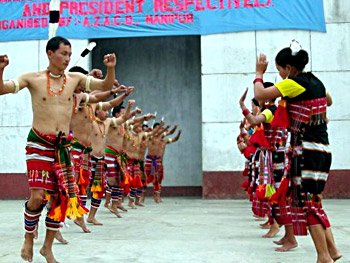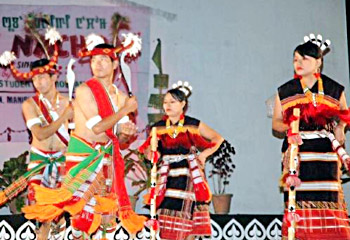 Celebrations of the festivals of Naga tribes are social and cultural in nature and symbolize the feeling of the whole community. The Nagas are proud of their rich cultural heritage which is also reflected in their festivals. The Naga festivals are multifaceted cultural phenomenon. Their festivals are related to their religion which is again associated with their economic vocations, social and cultural ethos. Their festivals are celebrated in relation with different stages of agricultural activity. Festivals are characterized by community feast and rice-beer. Offering is made to the supreme god Tingkao-Ragwang, the ancestors, the spirits and the deities in all festivals.
Celebrations of the festivals of Naga tribes are social and cultural in nature and symbolize the feeling of the whole community. The Nagas are proud of their rich cultural heritage which is also reflected in their festivals. The Naga festivals are multifaceted cultural phenomenon. Their festivals are related to their religion which is again associated with their economic vocations, social and cultural ethos. Their festivals are celebrated in relation with different stages of agricultural activity. Festivals are characterized by community feast and rice-beer. Offering is made to the supreme god Tingkao-Ragwang, the ancestors, the spirits and the deities in all festivals.
The Nagas perform more than seventeen festivals throughout the year. Gan Ngai, Rih Ngai, Nanu, Gantham Luithan Bapmei, Napko, Ginkimei, Ten Ngai, Nap Kaodai, Nagungkapmei, Chakak and Ponghi are the major festivals of this tribe.
Some festivals are described below:
Gan Ngai
Gan Ngai is the greatest festival. Earlier it used to be celebrated for seven days but now it is celebrated for five days. It is a post harvesting festival which is celebrated in the month of December-January every year. It is also as Chakan-Gan Ngai. Firstly, fire is produced by rubbing wood and bamboo split against each other. This fire is distributed to every house hold in the village and this is known as Mairapmei. This festival is also recognized as festival of lights. A farewell feast is celebrated for the spirits of the people who died the previous year.
Rih-Ngai
Previously Rih-Ngai lasted for three days but now it is celebrated in only on one day. It is a war festival in which a ritual is held for purifying the village and men folk who are the village warriors. This festival is not accompanied by any song and dance.
Nanu or Nanmu
Nanu or Nanmu is the children`s ear boring festival. The ears of all children born during previous year in the village are pierced on this particular day. It is celebrated in the house of Karapei Kaibang or an old woman. It is associated with fertility cult. Elderly men and women take active part in singing fertility songs. Songs are sung by men and the women dance to it. Grand feast for the villagers is arranged. The villagers pray to the concerned deity for the longevity of the new born babies and fertility of the village in this ceremony.
Gantham
This is a spring festival where all the deities are worshipped by offering animals. It is celebrated for the welfare of the people.
Napko or Napao
This festival is celebrated by the villagers as a whole or by an individual family. It is designated as soul of paddy. In this festival a pig is sacrificed and its flesh is distributed to every household in the village. Distribution of small piece of liver of that sacrificed pig is made to each family to offer to the family hearth. Agricultural activities begin after the celebration of this festival.
Gingkimei
 This religious festival is celebrated to satisfy the goddess of wealth. There is a belief that by offering the concerned goddess the bad spirits are driven from the house and the village. A pig is sacrificed and its meat is cooked which is distributed to every house hold. It is distributed at the front door.
This religious festival is celebrated to satisfy the goddess of wealth. There is a belief that by offering the concerned goddess the bad spirits are driven from the house and the village. A pig is sacrificed and its meat is cooked which is distributed to every house hold. It is distributed at the front door.
Gudui
Tingkao Ragwang is the supreme good. He is worshipped before the seed is sown in the field. The god is pleased by offering chicken or pig or both. The sacrificed animal is cooked and the soup of this meat is mixed with ginger soup and is drunk by every one. This is also known as ginger soup drinking festival. In this occasion they also worship the earth for the fertility of soil and for fruitful cultivation. In the afternoon throwing of flower bouquet among the boys and girls is organised which is followed by tug-of-war competition between males and females. Female winner is the indication of good yields in the coming year.
Tun-Ngai and Ten-Ngai
Inauguration of the festival is made by producing fresh fire of Mairapmei in rainy season. This is known as social service festival because boys and girls take active part in cleaning the village roads. Ten-Ngai is related to clean the pond and paths leading to Jhum and terrace cultivation fields.
Napkaodai
This is another religious festival which is celebrated at village level. God of crops is worshipped by offering a pig. This offering is made for good crops. Uncooked meat of sacrificed pig is given to every family of the village then it is cooked at home.
Pok-Pha or Pukphat Ngai is a festival which is celebrated as a relief from hard work and expectancy of good harvest.
















